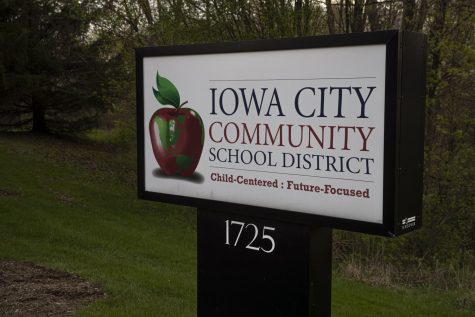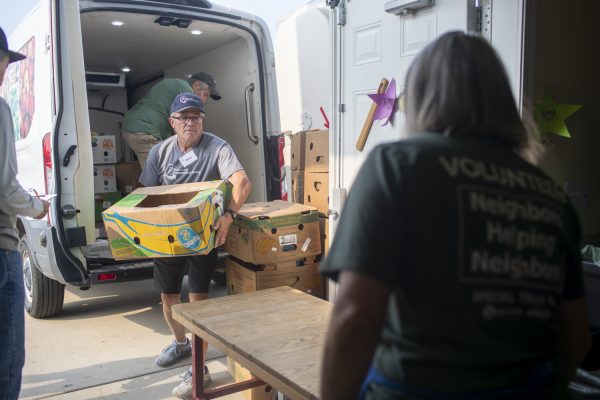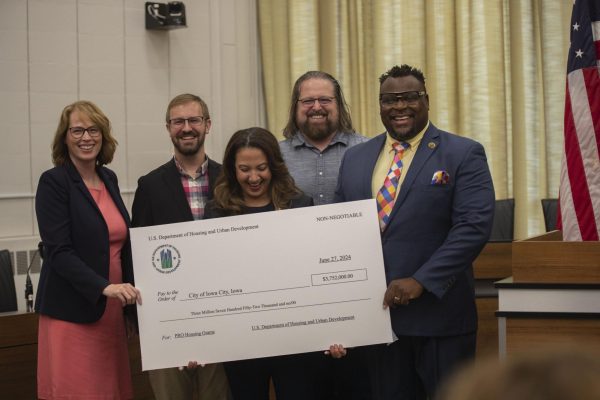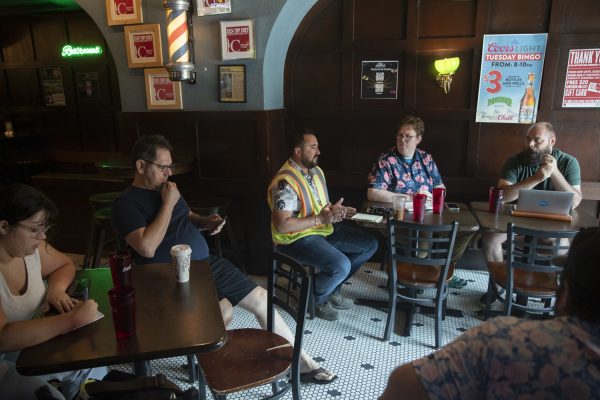University of Iowa Hospitals and Clinics translators eliminate language barriers, improve patient care
Translators work with patients and families who do not speak fluent language to establish trust with their medical professionals and receive the same quality of care.
University of Iowa Hospitals and Clinics are seen on Tuesday, June 23, 2020.
October 6, 2020
University of Iowa Hospitals and Clinics translators are seeking to improve health care for medical professionals and patients by eliminating language barriers so that non-native English speakers are able to be involved in their own care.
The hospital’s Interpretation and Translation Services offers 24-hour interpretation from trained professionals, video options, and an online service for patients who do not have access to an in-person translator.
One translator, Adrian Silva, said translators help patients stay involved in their health care and improve patient outcomes.
“When you have effective communication, you reduce misinterpretations that could lead to a patient taking the wrong medicine, for example,” Silva said. “If they don’t understand something, they could be putting their life at risk. When we have good communication, it helps people have a better outcome, regardless of what’s going on.”
Martin Rodriguez, another translator, said translators help patients feel more comfortable when discussing their medical concerns.
“Just because they don’t speak the language doesn’t mean they need to receive any different care,” Silva said. “My mission is to provide the best interpreting possible so that everyone can understand what’s happening to their health.”
RELATED: UIHC Respiratory Illness Follow-Up Clinic helps patients with ongoing effects of COVID-19
The translation team is composed of about a dozen individuals who can provide translations in Swahili, Arabic, Mandarin Chinese, Vietnamese, French, Spanish, and American Sign Language, Silva said.
He said the team can communicate with people who speak a language other than what the in-person translators can speak using CyraCom, a service that offers phone and video interpretations.
The service has expanded since 1975, when it was founded to help Vietnamese and Spanish-speaking workers, Silva said.
Translators often have special connections to this field, Silva said. He moved from Mexico to the U.S. when he was eight years old, Silvia added, so he understands what it feels like to not know the language.
Rodriguez moved from Colombia to Iowa when he was a child, and said he did not know English, so he saw the value of interpreting when it came to ensuring that he and his family understood their medical care.
“I wanted to help patients because I had been in their shoes when I first moved to this country,” Rodriguez said. “I know how difficult and overbearing it can be having to go to the doctor and wondering if I’m going to understand this appointment.”
Patients rely on medical professionals, Silva said. This can be difficult when they don’t know what the doctors and nurses are saying, he said.
RELATED: UIHC creates Spanish website
“Patients get less tense when we walk into a room, because they know we are going to understand them,” Rodriguez said. “They know that we know some of their cultural backgrounds that might be a little bit different than American norms. They know they have someone on their side.”
Silva said the medical professionals and families appreciate the assistance in ensuring that everyone understands how best to address medical concerns.
“Having translators helps to ease a lot of patient concerns, because they also recognize the language barrier,” said UIHC Pediatric Oncology Nurse Care Coordinator Amber Reiten. “The education we need to provide is very important to their child. Having in-person translators allows us to see the weight be lifted off the shoulders of our families.”
Reiten said she prefers in-person translators from UIHC because they build connections that cannot be found in services offered over the phone.
“Interpreters who remember details are huge when building trust with our families,” Reiten said. “Once you have that trust established, these families are much more open to asking questions that they may have been scared to ask before.”
All the hospital translators are proud to work for the UI because of its prestigious medical community, Silva said. He values the compassion that medical professionals have for their patients as well, he said.
“All the staff I worked with were so empathetic to people’s needs and were very kind,” Silva said. “You could tell that they really wanted to help every person who came through that door.”




















